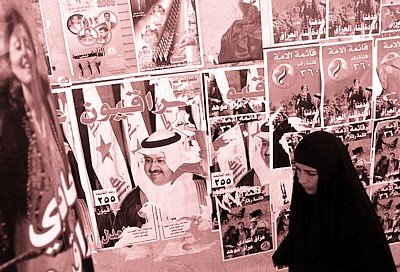Rifts emerge in Iraq govt after "bomb plot" foiled

Campaign posters in Baghdad, 2005
BAGHDAD, Oct 1 (Reuters) - Sunni and Shi'ite leaders in Iraq clashed publicly on Sunday over a U.S. allegation that a bodyguard for a top Sunni politician may have plotted an al Qaeda suicide attack on the vast Green Zone government compound.
Rifts between parties in the four-month-old unity government broke the surface as data indicated sectarian violence may have claimed a record number of victims last month and a new mass kidnap saw 26 meat factory workers seized by gunmen in Baghdad.
Iraq's national security adviser said security forces were closing in on the al Qaeda leader in Iraq who took over from the late Abu Musab al-Zarqawi in June. But the U.S. ambassador said the main threat to Iraq was now from general sectarian violence.
As Baghdad returned to nervous normality after a 24-hour curfew imposed to avert the suicide bomb threat, a leading parliamentary supporter of Shi'ite cleric Moqtada al-Sadr accused the government of being "infiltrated by terrorists".
He was responding to the arrest on Friday of a bodyguard to Adnan al-Dulaimi, leader of the Sunni Accordance Front bloc. The U.S. military said the man may have been plotting a major al Qaeda suicide attack on the parliament and government complex.
Bahaa al-Araji, prominent in the Shi'ite Alliance bloc of which Sadr is part, demanded that Alliance Prime Minister Nuri al-Maliki reshuffle his cabinet to improve security. He hinted that Shi'ite leaders no longer trusted Sunni Deputy Prime Minister Salam al-Zobaie, who is in charge of security issues.
That drew a sharp response from allies of Dulaimi: "All this talk about car bombs and so on in Adnan Dulaimi's house is fabricated," the Accordance Front's Hussein al-Falluji said.
"It seems there's some kind of political pressure from some people in the Alliance and the timing of this issue was calculated in advance to affect his standing," he told Reuters.
An ally of Maliki said the premier was sticking to a plan to reshuffle his cabinet and expected to do so this month: "There is strong support for change ... from the Alliance," he said.
"The prime minister is strong but his cabinet is weak."
Among those named as possible targets for a reshuffle have been supporters of Sadr, whose Mehdi Army militia followers are blamed for much sectarian violence by U.S. and some Iraqi officials. Some Sadr supporters say they would be better off in opposition.
Cajoled under U.S. pressure following a December election to form a government involving Shi'ite, Sunni and Kurdish parties in parliament, Maliki faces a delicate job in adjusting the balance of his cabinet just four months after establishing it.
Partial statistics released by the Health and Interior Ministries indicated that the number of civilians killed in September leapt by over 40 percent to a record high. Though not complete, the series of data is an early indicator of trends.
Read the rest at Reuters/Alternet
Related Link:
Iraqi Shi'ite politicians demand cabinet reshuffle
Related Link:
U.S.: Captured al-Qaida suspect was in 'final stages' of planning Green Zone attack
Related Link:
Guard of top Sunni politician said involved in plot that caused Baghdad curfew
Related Link:
U.S. Envoy Says Iraqi Premier Has Short Time to Quell Violence
Related Link:
Commander backs Iraqi PM after criticism
Related Link:
Commander Urges Disarming Iraq Militias
Related Link:
American commanders question political will of Iraqi Prime Minister
Related Link:
Doubts Rise on Iraqi Premier’s Strength
Related Link:
U.S.: al-Sadr losing control of Mahdi Army
Related Link:
U.S. says Iran buys Iraq militia with arms, cash
Related Link:
U.S.: Sadr City Again a Militants' Haven
Related Link:
Sunni, Shiite factions carve up Baghdad

<< Home